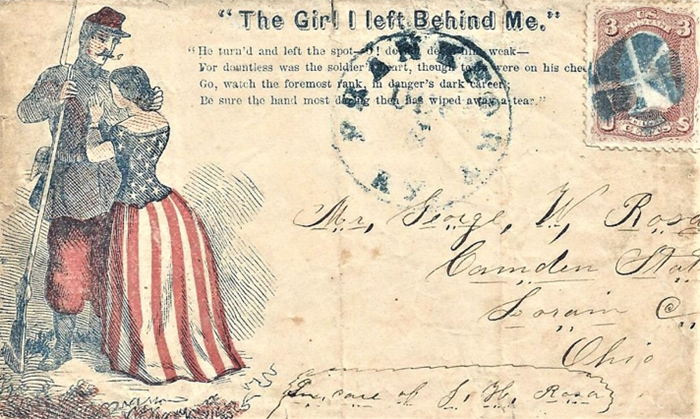On February 4, 1861, the states of South Carolina, Mississippi, Georgia, Alabama, Florida, Louisiana, and Texas formed the Confederate States of America. Later, six additional states joined the Confederacy: Virginia, Tennessee, Arkansas, North Carolina, Missouri and Kentucky.
On March 21, 1861, the Confederate Congress organized a Confederate States Post Office (CSPO), and on June 1, 1861, the CSPO took control of all United States Post Offices (USPO) within their territory. As the CSPO had no stamps of their own, they used USPO stamps.
As the break between the United States and the Confederate States had not at this time become absolute, regular USPO mail continued to flow between Frankfort and the Confederate States. This all changed in early July 1861. Letters moving south from Frankfort, at this time, traveled by rail, Louisville & Frankfort Railroad, to Louisville, and then by the Louisville & Nashville Railroad (L&N) south into Tennessee.

In early July 1861, the USPO finally realized that CSPO Postmasters were not forwarding monies they collected to Washington, D.C., but instead to the CSPO in Richmond, Virginia. John Speed, the Louisville postmaster, began stamping all letters arriving from CSA states with the notation, “Southern Letter Unpaid.” A resident of Frankfort thereafter had to pay $.03 to the Frankfort postmaster for a letter so marked, even if franked with a USPO stamp.
In late July 1861, the USPO would no longer forward or receive a letter from a CSA state. A citizen of Frankfort wishing to communicate with a relative in Nashville, Tennessee, had to hand the letter over to the Frankfort Adams Express agent and pay him the cost of delivering the letter. The letter now moved south to Nashville outside of the USPO hands.
In Nashville, it was placed by the Adam’s Express agent in CSPO hands. The reverse was true of a letter coming north from Nashville to Frankfort. The letter traveled by Adams Express to Louisville in an express baggage car on an L&N train. In Louisville, the letter was placed in the hands of the USPO by the Adams Express agent for delivery to Frankfort.
On Aug. 28, 1861, the U. S. Government, in response to fear that the letters carried by the Adams Express agent held treasonable information, banned the forwarding of all mail by the Adams Express Company from an area in which the USPO operated to an area in which the CSPO operated. Letters now bound for a person in Tennessee had to be smuggled from Frankfort through the front lines to where the CSPO operated.
The reverse was true of a letter originating in an area controlled by the CSA but destined for Frankfort. A profitable but illegal mail service was soon being offered by certain individuals to move mail from Frankfort to an area served by the CSPO or carry a letter back through the armies’ front lines to Frankfort. Those carrying such mail, when captured by federal authorities, were considered spies.
On Aug. 1, 1861, the USPO demonetized all existing USPO stamps and issued a new set of stamps. Thereafter, only a letter carrying an 1861 printed stamp would be permitted to be moved through the USPO system to a recipient. This dual postal service offered by the USPO and the CSPO lasted until the summer of 1865 when the last land served by the CSPO re-entered the folds of the USPO.
One of the voids in the Capital City Museum collection of memorabilia is the lack of Civil War era letters to or from Frankfort.
The CSA said Kentucky and Missouri joined the CSA, but Kentucky and Missouri never voted to secede.










